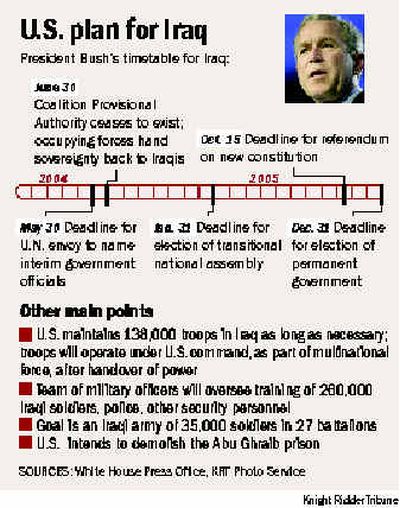U.S., Brits at odds over Iraqi control

WASHINGTON – The United States and Britain appeared at odds Tuesday over how much control Iraq’s caretaker government will have over American-led military operations after the handover of political authority on June 30.
Secretary of State Colin Powell said U.S.-led troops will do “what is necessary to protect themselves.” In London, British Prime Minister Tony Blair said Iraqis should have the final say over any major military operations.
The apparent difference underscored one of the many pieces of unfinished business as Iraq begins a new era with the selection of interim political leaders who will run the government until elections are held by early next year. The White House says the new leaders will be named by early next week and perhaps sooner.
Bush administration officials said Iraq’s new government will have a consulting and coordinating role over U.S. troop operations that still needs to be defined. Britain agrees, yet Blair said significant offensives, such as the U.S. assault on the city of Fallujah last month, would not take place without the consent of the new government.
Powell said at a news conference that Iraq’s interim government will have full sovereignty, and so it will “have a role to play, obviously” in the activities of U.S. forces who will still be on the ground after June 30. The United States has 138,000 troops in Iraq who will continue to serve under U.S. command after the turnover of political power.
Powell said that “if it comes down to the United States armed forces protecting themselves or in some way accomplishing their mission” in a way not in accord with the Iraqis, the U.S. forces “will do what is necessary to protect themselves.”
In London, Blair stressed that British troops would not be under the control of the interim government after the transfer of power. But he said the “final political control as to whether you go into a place like Fallujah in a particular way – that has to be done with the consent of the Iraqi government.”
A senior Bush administration official in Baghdad said the issue over who has the final word about the activities of U.S.-led coalition troops after sovereignty is transferred would be the first one addressed by the United States and members of the interim government once its leaders are named.
The administration official said the list of names for the interim government had been narrowed, but that no final decisions have been made. “We’re down to a handful of names for each of the positions and in some cases a smaller number than that,” the official said on condition of anonymity.
Separately, a senior U.S. diplomat, also speaking on condition of anonymity, said U.N. envoy Lakhdar Brahimi, U.S. administrator L. Paul Bremer, U.S. diplomat Robert Blackwill and some members of the U.S.-appointed Iraqi Governing Council met Tuesday to “crunch names.”
A U.N. Security Council resolution calls for a multinational force that would work in concert with the Iraqi interim government through “consultative and coordinating mechanisms.”
Meanwhile, the United States’ effort to get a new U.N. resolution approved showed little sign of inducing other countries to offer more troops.
Pakistan said it was considering the U.S. request but only for a special force to protect U.N. facilities in Iraq. France repeated its strong refusal to ever send in soldiers.
Washington’s previous calls for more contributions have largely been rebuffed, and suggestions that Muslim or Arab nations should play a military role in Iraq have not yielded positive responses. War opponents Germany and China praised the draft resolution, but Germany, France and Russia are likely to press for the United States to give the interim government more say over U.S., international and Iraqi armed forces.